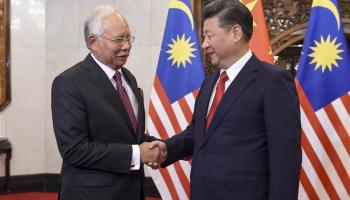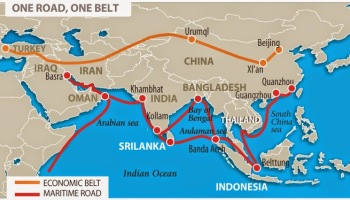MINISTER in the Prime Minister’s Department Datuk Paul Low recently told the Dewan Rakyat that the Malaysian Anti-Corruption Commission (MACC) detained 1,011 civil servants and 26 executives of government-linked companies (GLCs) for alleged corruption and money-laundering between 2014 and September this year.
Assets amounting to almost RM172mil were seized and frozen in relation to these cases.
The government officers nabbed outnumbered the GLC executives by nearly 40 to one, but that is no reason to focus less on the fight against corruption in the GLCs.
The GLCs are in many ways a special class of companies.
A GLC is like any other company in the sense that its primary objective is to make money from commercial activities.
At the same time, a GLC is controlled by the Government (usually through majority shareholding) and is thus an extension of the Government.
But that is not the only way that a GLC is like a government department or a statutory body.
Often, GLCs serve as instruments of public policy.
For example, they undertake huge projects that drive the country’s development. They are in industries that are strategic to national interests — aviation, finance, telecommunications, natural resources, automotive, ports and power.
They tailor certain aspects of their operations, such as human resources and procurement, to suit objectives set by the Government. And they champion causes that support what the authorities want to do.
As such, we have every reason to be dismayed if a GLC is not run with integrity and efficiency.
Do we derive comfort from the MACC’s detention of two GLC top men over the past week?
On Nov 10, the Commission picked up the general manager of a GLC at his house in Seremban to assist in a corruption probe.
And on Monday, a director of a GLC was detained for alleged abuse of power and corruption back when he was chief executive officer of another GLC.
We can view these developments as encouraging signs of the MACC stepping up its efforts to combat corruption in GLCs.
But the feel-good factor will not last if the investigations are not followed by swift and successful prosecution.
Hauling up people for questioning and freezing assets is only half the job.
The culprits must be brought to court and people need to see justice delivered without fear or favour.
If this does not happen, it only serves to bolster the longstanding argument that government has no business being in business.

By The Star Says - The Star analyses the issues and developments of the day, and offers a viewpoint.
In Related News:

Water Corruption | SSWM http://www.sswm.info/content/water-corruption The Star Says: A crisis of integrity and a lesson to be learnt ...
Assets amounting to almost RM172mil were seized and frozen in relation to these cases.
The government officers nabbed outnumbered the GLC executives by nearly 40 to one, but that is no reason to focus less on the fight against corruption in the GLCs.
The GLCs are in many ways a special class of companies.
A GLC is like any other company in the sense that its primary objective is to make money from commercial activities.
At the same time, a GLC is controlled by the Government (usually through majority shareholding) and is thus an extension of the Government.
But that is not the only way that a GLC is like a government department or a statutory body.
Often, GLCs serve as instruments of public policy.
For example, they undertake huge projects that drive the country’s development. They are in industries that are strategic to national interests — aviation, finance, telecommunications, natural resources, automotive, ports and power.
They tailor certain aspects of their operations, such as human resources and procurement, to suit objectives set by the Government. And they champion causes that support what the authorities want to do.
As such, we have every reason to be dismayed if a GLC is not run with integrity and efficiency.
Do we derive comfort from the MACC’s detention of two GLC top men over the past week?
On Nov 10, the Commission picked up the general manager of a GLC at his house in Seremban to assist in a corruption probe.
And on Monday, a director of a GLC was detained for alleged abuse of power and corruption back when he was chief executive officer of another GLC.
We can view these developments as encouraging signs of the MACC stepping up its efforts to combat corruption in GLCs.
But the feel-good factor will not last if the investigations are not followed by swift and successful prosecution.
Hauling up people for questioning and freezing assets is only half the job.
The culprits must be brought to court and people need to see justice delivered without fear or favour.
If this does not happen, it only serves to bolster the longstanding argument that government has no business being in business.

By The Star Says - The Star analyses the issues and developments of the day, and offers a viewpoint.
Related: Let us do more against graft
In Related News:
GLC GM, two others remanded in corruption
MACC arrests GLC manager
GLC GM among 10 arrested over alleged abuse of power, corruption ...
MACC arrests sibling of detained ex-GLC CEO
GLC director, 2 others remanded for power abuse ..
Top GLC official held for RM15m graft
MACC arrest GLC managing director for abuse of power and graft ...
"Bank GM among 10 arrested over alleged abuse of ...
Bank GM Among 10 Arrested Over Alleged Abuse Of Power, Corruption
MACC probes 20 firms for possible graft
MACC: GLC's ex-CEO to be arrested soon over RM50m graft case ...
MACC detains GLC director, RM39.3m seized
Weaknesses in management caused leakages, says Hasni
MACC arrests sibling of detained ex-GLC CEO
Suspect transferred RM1.5mil to brother
Another GLC director probed for corruption
Manager of GLC picked up by MACC over graft
Nabbed over power abuse
MACC probing another big fish living life lavishly
Related posts:
Mar 10, 2016 ... KUALA LUMPUR: Malaysia's ranking dropped four places in the Corruption
Perceptions Index (CPI) last year. The index, released by ...
The Corruption case in the Youth & Sports Ministry Malaysia is a reflection of broken systems in country
Mar 23, 2016 ... The Corruption case in the Youth & Sports Ministry Malaysia is a reflection of
broken systems in country. The brazen embezzlement of ...


Fighting corruption must be serious !
Oct 15, 2016 ... Sabah's watergate scandal unfolds, engineers nabbed, civil service back in
vogue .... Civil service back in vogue - for the wrong reasons.
https://youtu.be/01stOYgM9x0 It was a record haul by the Malaysian Anti-Corruption Commission – RM114mil seized from two top officer...
Jabatan Air Negeri Sabah - http://malaysianlogo.blogspot.my/2014/06/jabatan-air-negeri-sabah-sabah.html KOTA KINABALU: Everywhere in Sab...


Jabatan Air Negeri - Customer Service How the millions were
stolen? 1. Contracts broken down to small packages of RM100,000 ea...





 Movers and shakers: Dr Wee (centre) flanked by former Taiwan President Ma Ying-jeou (Wee’s right) and WCES founder and patron and Country Heights Group of Companies founder Tan Sri Lee Kim Yew cutting ribbons at the opening ceremony of the 8th WCES in Malacca. Also joining them are (from left) WCES co-chairmain Datuk Seri David Yeat, Asli CEO Tan Sri Michael Yeoh, Asli and Sunway Group chairman Tan Sri Jeffrey Cheah, Plantation Industries and Commodities Minister Datuk Seri Mah Siew Keong, former Indonesian President Susilo Bambang Yudhoyono, Malacca Chief Minister Datuk Seri Idris Haron, former Australian Prime Minister Kevin Rudd, former Pakistani Prime Minister Shaukat Aziz, former Thai Deputy Prime Minister Dr Surakiart Sathirathai, Quest International University Perak chief operating officer Nicholas Goh, Mah Sing Group marketing and innovation general manager Lily Lee and Star Media Group Bhd editor-in-chief Datuk Leanne Goh.
Movers and shakers: Dr Wee (centre) flanked by former Taiwan President Ma Ying-jeou (Wee’s right) and WCES founder and patron and Country Heights Group of Companies founder Tan Sri Lee Kim Yew cutting ribbons at the opening ceremony of the 8th WCES in Malacca. Also joining them are (from left) WCES co-chairmain Datuk Seri David Yeat, Asli CEO Tan Sri Michael Yeoh, Asli and Sunway Group chairman Tan Sri Jeffrey Cheah, Plantation Industries and Commodities Minister Datuk Seri Mah Siew Keong, former Indonesian President Susilo Bambang Yudhoyono, Malacca Chief Minister Datuk Seri Idris Haron, former Australian Prime Minister Kevin Rudd, former Pakistani Prime Minister Shaukat Aziz, former Thai Deputy Prime Minister Dr Surakiart Sathirathai, Quest International University Perak chief operating officer Nicholas Goh, Mah Sing Group marketing and innovation general manager Lily Lee and Star Media Group Bhd editor-in-chief Datuk Leanne Goh.







 That is what is sorely needed to improve MCA’s chances of winning back the Chinese vote in the next general election, which is Najib’s ultimate challenge to the party.
That is what is sorely needed to improve MCA’s chances of winning back the Chinese vote in the next general election, which is Najib’s ultimate challenge to the party.





 Pivotal moment: The PM in talks with President Xi Jinping during a meeting at Diaoyutai state guesthouse in Beijing.
Pivotal moment: The PM in talks with President Xi Jinping during a meeting at Diaoyutai state guesthouse in Beijing.

 Angry lot: People chanting slogans during a rally demanding Park step down, in central Seoul. — Reuters
Angry lot: People chanting slogans during a rally demanding Park step down, in central Seoul. — Reuters US president-elect Donald Trump gives a speech during election night at the New York Hilton Midtown in New York on Nov 8, 2016. PHOTO: AFP
US president-elect Donald Trump gives a speech during election night at the New York Hilton Midtown in New York on Nov 8, 2016. PHOTO: AFP
